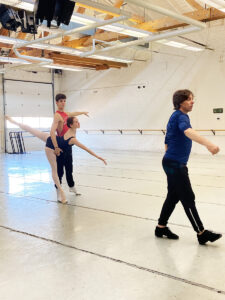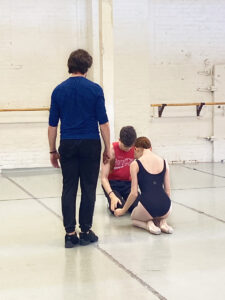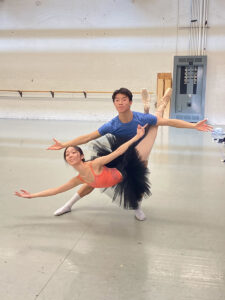


Six dancers from BalletMet will be performing in the International Ballet Competition in Jackson, Mississippi. Three Academy students—Claire Wessells, Jordan Sheppard, and Kyan Conaway-Gillman—will compete in the Junior division, while two BalletMet 2 members and one Company member (Sumi Ichikawa and Tristan Toy, and Miguel Wansing Lorrio) will compete in the Senior division. We had the opportunity to speak with Academy Director Maria Torija and Artistic Director Edwaard Liang about the preparation and demands of ballet competition.
Maria Torija
What we’re looking for, when we offer a dancer the opportunity to go to a competition…They have to be technically ready for it, they have to have the endurance, and they have to have something special in their artistry. Like a poetic quality or a bravura quality…A very special quality of movement, altogether combined with the technique and the persistence. People that we know that have the nerve and are capable of going through a situation like this and present themselves at their best. And of course, there’s always something that happens, so they must have the capability to also be fast enough to improvise, in case onstage something goes wrong.
Jackson, in particular, is a very important competition. And we are so proud and super excited that six of the dancers, three Academy students, one Company member and two BalletMet 2 dancers are being invited, which already that’s a big thing! So, at the moment, what we’re doing is working with them. Since the season finished, 2 – 2 1/2 hours every day on the rep that they’re going to be presenting. So, they take class in the morning–the Academy students, they still have to rehearse in the Academy rehearsals for the upcoming performances–and then they rehearse for 2-2 1/2 hours on a daily basis. The ones that are going as soloists have to dance six solos. The ones that are going as couples have to present four pas de deuxs. Two classical, which includes pas de deux, variations, and coda, and two contemporary pieces.
They started rehearsing one pas de deux or two solos back in December. For the younger ones, I would say maybe November? And we worked on it and submitted a video to Jackson, like an audition. And then of course they were invited or not. They did invite all of our dancers. Then we had some of these younger students, the Junior division ones, that had also competed at the YAGP regionals and in the finals. Some of the pas de deuxs and solos they performed there, they were already part of what we would present at the Jackson competition in case they invited us. And then later we got invited! So, half the work in the classical, especially with the younger students, we did throughout December until March. Now the contemporary rehearsals started when the BalletMet season finished in late April. Then the others, the Company, the professionals, the Seniors, they prepared for their video, but then everything else they started when the season finished.
The pieces in the classical category are very specific. They make you choose from a list and the choice is very limited. So you cannot choose from everything in the classical repertoire. They give you a list, and then you choose from that what you think is best for you. But that list is very small.
As for the pieces we ended up selecting…The Juniors couple that we’re bringing, Jordan Sheppard and Claire Wessells, they’re performing the third act pas de deux of Coppelia with pas de deux variations and coda. For the second round, they are doing the Spring pas de deux of the ballet Seasons from Edwaard Liang, which will be the contemporary pas de deux. For the third round, they’re doing Grand Pas Classique and Finding Light from Edwaard Liang as the contemporary piece. Then, for the Junior soloist Kyan Conaway-Gillman, he is doing Flames of Paris. Andres Estevez is choreographing a contemporary solo for him, and I think he has another contemporary solo being choreographed for him too. Then he is going to be doing Black Swan, the Siegfried variation of the Black Swan. There’s a couple more that Kyan will be doing as well. There’s so many. Sumi Ichikawa and Tristan Toy are competing in the Senior pas de deux. They’re doing Satanella pas de deux. Then they are doing Symphonic Dances from Edwaard Liang and then, for the third round, they’re doing Sleeping Beauty and the Summer pas de deux of Seasons, from Edwaard Liang. Miguel Wansing Lorrio is doing Giselle as a Senior soloist, Giselle, La Sylphide, Seasons from Edwaard, one of the solos. He is also doing Raymonda and a Diana and Acteon solo. And then he’s doing Richard Siegal’s Metric Dozen as well.”
We are, of course, thrilled, and honored, and surprised that it was six of our dancers. Everybody from BalletMet who sent in a video was invited. It’s impressive. I was expecting maybe one or two but not six. Which is now a lot of work, but it’s a pleasure to do that work! It is great. And of course we are super happy that they’re going to be representing us and presenting themselves on this new path that is opening for them.
What’s led to this success, in the BalletMet Academy, is our consistent syllabus. And it’s a syllabus that was conceived for BalletMet. For the number of days the students come, depending on their age and level…Of course, it gets more and more involved the older they get, but it’s being conceived that way, at the pace it should be done. So it’s not just random teaching steps. The musical tempos are very, very important. And our ballet teachers get teacher training on a regular basis so that we are all on the same page and the kids can get a very functional way of learning ballet. So I’m proud of BalletMet, that we are a school that succeeds based on the children that we bring up. We already have a couple of Company dancers that started here, when they were like three years old, or five years, or six, and we teach them with this syllabus, all the way up through the Trainee program to BalletMet 2 and into the Company. Because the success of a school is not the students you get at 16 or 17 that actually have been trained by somebody else, where you just put your name on them because you trained them the last two years, but the work was really done by somebody else. The success of a school, where a school really shows that it is a good school, is when you educate children from the beginning to professional. That’s when you show that you have a good faculty at your school. And that’s what I’m proud of. That’s why I think we are very different from many other schools, because a lot of our children…They come, they find jobs. They get into BalletMet. They get into other companies. And they’re strong enough to compete, to present themselves in this very competitive dance form.
Edwaard Liang
For the competition, they’ve selected quite a few different pieces. We’re going to adapt them to the strengths of each couple and individual. Several are doing sections of my own work. I’m very grateful that they’ve selected my pieces and that I get to be a part of their competition journey.
What’s been wonderful about the teachers and the leadership in BalletMet’s Dance Academy is that they’re all in on supporting the artists. An incredible adventure such as the Jackson competition only happens every four years or so. And it’s very different. It’s not a competition where it’s pay-to-play. You have to be invited. And once you are invited, your expenses are paid for. I love that, because there’s equity in this and it’s not just the privileged that are able to participate. If you have talent, if you have ambition, if you have a desire to participate on this scale, in an international ballet competition, then you have the capacity without any barriers. Generally, BalletMet has never identified themselves as a competition school. But I really love that these artists have self-identified and have this desire to go outside the box. This experience is huge. To understand how big this dance landscape is, and to be surrounded by peers of your age and the amount of people that have the same passion…It’s exhilarating. I remember my first time going to New York and understanding that there were so many dancers that have the same interest, passion, and dedication to dance. I’m just so proud of the whole team. It takes a village to be able to prepare the dancers. It takes a lot of work, dedication, blood, sweat, and tears probably—hopefully less blood—but I’m just very proud of the whole organization, that they’re all in to support these dancers and the courage that it takes for these young artists to put themselves out there. I wish them all the best of luck.
Responses have been edited for clarity.

